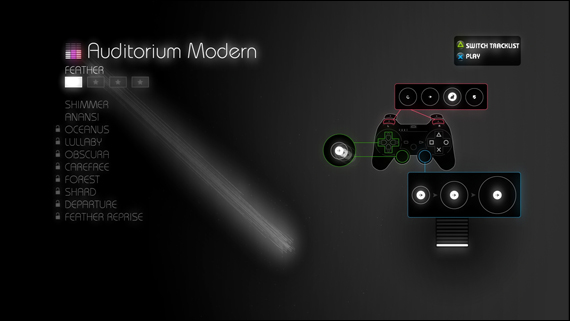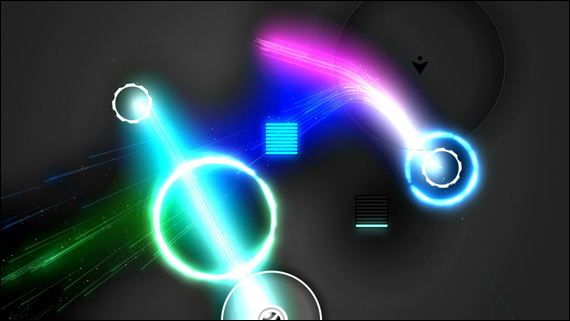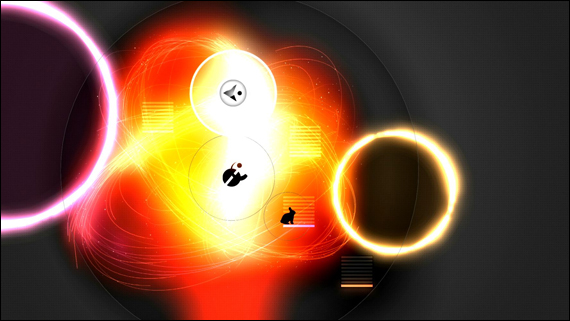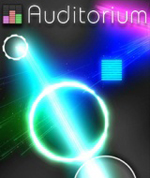
Having grown out of a flash game, Auditorium has perhaps hit the big time with this high-definition console release, and it’s not difficult to see why. A curious puzzling experience that’s as interesting to listen to and look at as it is to play, Auditorium HD brings an entirely unique sensory experience to players.
The objective is simple: move the colored light into the appropriately colored receptacle. The path (and later, color) of the light can be changed through the use of a number of spherical pieces afforded to the player in each stage. By changing the position and size of these spheres, the light can be directed to fill the appropriate receptacles, completing the stage and unlocking further stages. Auditorium supports the PlayStation Move controller, but I reviewed with the standard controller.

The menu of Auditorium consists only of a stage select, with a brief description of the controls. This represents the totality of instruction you will receive for the entirety of your experience. As you progress, new elements will be introduced via simple puzzles that encourage you to work out the new mechanics for yourself, and the result is an impressively intuitive experience, uncluttered by interruptions and tutorials. Progress is saved any time you retreat to the pause menu, allowing you to come back to a puzzle with everything where you left it next time you start the game. The result is the ability to float easily in and out, moving some light around, listening to some music, and solving some puzzles; a unique experience that probably has more in common with a relaxation exercise than any of the other music and rhythm games on the market.
Indeed, music fills the roll of a reward more than a gameplay mechanic—as you direct light into each receptacle, portions of the orchestral soundtrack will fade in, gradually completing the music experience as you play. What’s interesting here is that, listening to the music, it’s perfectly possible to solve a puzzle accidentally, without really paying attention to where the light is going or which receptacles are being filled. With the music fading in and out and your actions spilling light across the screen, random, instinctual movements can solve a puzzle as readily as deliberate planning and positioning.

As a puzzle game, it is perhaps unavoidable that the enjoyability can decline sharply, should your head be in the wrong place. If you’re not approaching a puzzle from the right perspective, it may feel that you simply haven’t been afforded the correct resources for solving it. Equally, if a frustrating puzzle is solved in an accidental way—a way you couldn’t be expected to arrive at via simple reasoning—the knowledge that you did, in fact, defeat the challenge is somewhat bittersweet. I found that sometimes it improved my experience to simply walk away for a time, and tackle a difficult puzzle later, when I would perhaps be able to look at it differently.
It’s surprisingly simple to become lost in a challenging puzzle, or lost in your progress if you find yourself quickly dispatching several stages. During one of the more elaborate challenges, I eventually found that I had spent upwards of an hour on that single puzzle—and I had still not solved it. Although frustration eventually set in, and I moved on, it’s worth noting that spending this much time on a puzzle in any other game would be unthinkable—any reasonable player would give up and consult the internet for the solution. In Auditorium, it’s unnecessary to worry that you are missing some crucial detail or technique; the reality is that everything you need is laid out in front of you, and you need only find a way to combine those resources.
Following from the wide array of effects your light-manipulating pieces can have, there can be more than one solution to a problem, and sometimes you may find one sufficiently innovative that does not require all the pieces you’ve been afforded. The unfortunate side-effect of this flexibility is that you may sometimes find situations where getting the pieces to respond the way you need them to is unreasonably tricky, requiring fine positioning that can be difficult to achieve.

Though visually uncomplicated, it’s intriguing to observe the patterns that can be created with the light, sometimes encouraging more freeform play, as opposed to the deliberate solving of puzzles. However, I found myself looking for some variation in the background, which doesn’t change the standard gray from puzzle to puzzle.
The soundtrack is of special note, and not merely because it represents a sizable portion of the experience. The orchestral score is exceptional, creating a relaxed but intriguing atmosphere and encouraging one to play onward to hear more of the fantastic music. There’s also an element of interactivity to the soundtrack, as allowing portions of each track to fade in or out can change the character of the score. Though you’re not likely to forget about solving the puzzle, it can be rewarding to listen to different combinations of the track pieces as you play.
Auditorium HD, with its deceptive simplicity could be easily overlooked by players, but for those who take the dive it becomes a strangely addictive game, offering a strong selection of puzzles, realized through a sharply designed mechanic and supplemented by neat visuals and an exceptional soundtrack.
Cipher Prime
Publisher
Zoo Publishing, Inc.
System
PlayStation 3 (PSN)
Modes
Singleplayer
Release Date
November 23, 2010
Price
$9.99
*A copy of this title was provided by the publisher for review

Great review Brad. I’ll try the demo for it since it does sound like the type of game I’d like to have in my collection.
Comment by EdEN — November 30, 2010 @ 12:21 pm